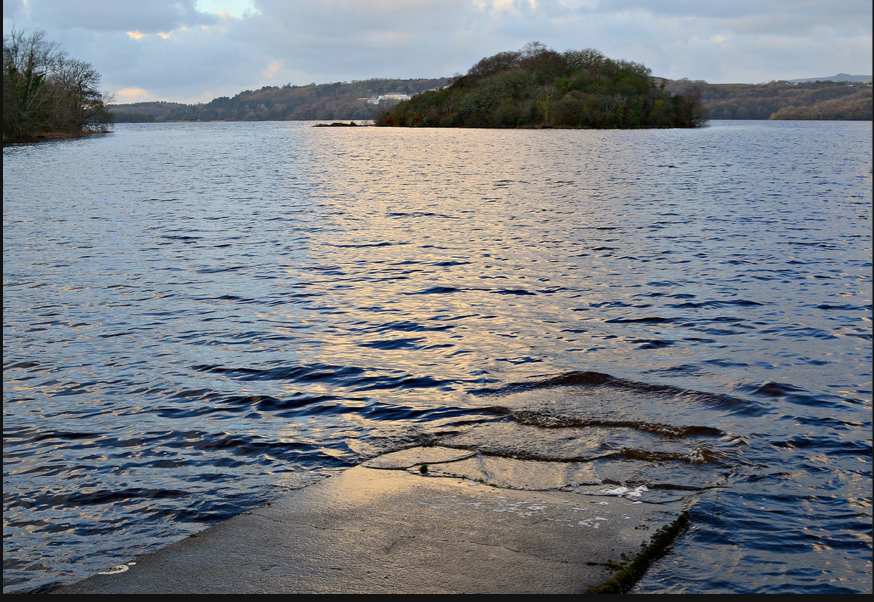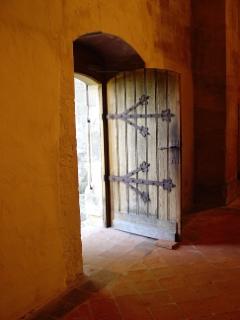Blog
I must go, I will go: Poetry as Respite and Transformation
In the introduction to his poetry anthology, Through Corridors of Light, which I wrote about a few weeks back, John Andrew Denny writes about how poetry came to offer a respite from the cabin fever imposed by illness. He’d been suffering with ME and Chronic Fatigue Syndrome (what is sometimes called CFIDS) when a poem, arriving on a postcard from a friend, catalyzed a shift in his experience. The poem was John Masefield’s Sea Fever. His wife had the genius to blow the poem up to poster size and put it up on his bedroom wall. He writes: Until then I had spent most of my days lying on my back, gazing at the ceiling and half-listening to the radio. Now I was just as likely to be lying on my side, focusing my mind on a few lines of the poem. I was mesmerized by the music and the rhythm of its language, and I took comfort in saying its lines over and over like a mantra, which would run through my head at odd times of the day and night. To my delight I found that repeated reading set my imagination alight and briefly transported me out of my prison of boredom and frustration. Saying its lines over and over like a mantra. Every few weeks he changed the poem. . . . when I followed WB Yeats’s imaginary escape from the grey London streets to his ‘Lake Isle of Innisfree’, I felt the exhilaration of freedom from my own narrow London flat, which in reality I could rarely leave. He writes: I found after several months that my feelings of being trapped began to dissolve. Something is happening here. In the first chapter – the first step – of my One Year of Writing and Healing – I write about the importance of discovering and creating and writing about healing places. The way these can become a kind of foundation for healing. But sometimes when one is ill it’s simply asking too much to write. Even reading a book can be too much. But a poem on a poster? Perhaps that could be just the thing. Or perhaps a single line to begin with. Or two lines? I love the way, in Denny’s case, how the lines of poetry – the music and rhythm of the language – gradually found its way into his mind – transforming thoughts of being trapped, gradually, gradually, into thoughts of finding respite. Something else interesting. Both poems (two of the three he mentions in this section of his introduction) begin in similar and compelling ways. The first, John Masefield’s Sea Fever begins: I must go down to the seas again, to the lonely sea and the sky The Lake Isle of Innisfree has an opening which echoes this: I will arise and go now, and go to Innisfree I must go. I will go. Something here I think about what poetry can do–and about what is possible in and with the mind. ________________________________________________ See also: Another piece on Through Corridors of Light Sea Fever by John Masefield read aloud at YouTube The Lake Isle of Innisfree by WB Yeats The photo above is of Innisfree, taken by Ben Bulben, and can be found here on Flicker. I like the way you...
read moreWriting and Healing Prompt: Opening the Door of Mercy
Last week I shared and analyzed an essay with my sophomores: “Opening the Door of Mercy,” an essay by Karen Round published as part of the “This I Believe” series on NPR. I couldn’t resist discovering the vivid language in her essay and rearranging it into a found poem, something I’ve discovered is helping me read more closely—and attend to language and form. So. . . here are her words rearranged on the page, a kind of distillation of the essay. The sky darkening. The silhouette of a woman sagging on our threshold. Our location forces difficult choices. Wisdom advises to act a Good Samaritan is to be naïve, risk terrible consequences. But when someone approaches, I have to decide: Is my own safety always the most important consideration? Must I fear all whom I don’t know? Do I help or not? I believe repeatedly rejecting others who need help endangers me. So here where we live on that afternoon one summer when the woman was sinking like the sun on my front porch, I made my choice. I opened the door. We discussed in class how this essay could become a kind of mentor text or catalyst—finding that moment or series of moments in one’s life where a choice had to be made—and then using that choice to begin an essay—and, in so doing, to find ways to bring other readers in, to recognize and write our way towards the notion that we are all often facing similar kinds of choices. Like this choice: when a stranger arrives at our threshold, do we open the door or not? (And how do we balance wisdom and compassion when we’re making such choices?) This essay also puts me in mind (yet once again) of Rumi’s poem about the guest house and the way that outer guests and inner guests can mirror each other and correspond. (I’m beginning to suspect this poem by Rumi can connect to many, many things.) This being human is a guest house. Every morning a new arrival. A joy, a depression, a meanness, some momentary awareness comes as an unexpected visitor. Welcome and entertain them all! Even if they’re a crowd of sorrows, who violently sweep your house empty of its furniture, still, treat each guest honorably. This could lead to yet another writing idea: Who or what is waiting at the threshold? Is now the right time—or not—to open the door? What might happen if one did? _________________________________________________ See also: Karin Round’s essay at NPR November Angels Rumi’s full poem, The Guest House, at Panhala...
read moreThrough Corridors of Light: Poems of Consolation during Illness
I have just become aware of a new poetry anthology published in the UK for people who are dealing with illness. The anthology is edited by John Andrew Denny, who writes, at his website: I was ill for more than twenty years with ME/Chronic Fatigue Syndrome. For most of that time I was bedbound, in pain and at times deeply depressed, and I was helped to an extraordinary degree by reading and meditating on poetry that addressed my own thoughts and feelings about my illness. In an email conversation, he also writes about a connection between reading poetry and writing, something I find of particular interest: The initial reason I compiled Through Corridors of Light was that when I was first ill (in 1991) I was so weak that anything longer than a short(ish) poem was beyond my concentration. Now that I am quite a lot stronger, I still find writing very slow, and creative writing is unsatisfying for me unless I can find some relevant model to stimulate my mind – so both of these impulses were what inspired my anthology. What makes it so therapeutic is that in giving voice to one’s hopes, fears, worries, or desires, the poems not only trigger other thoughts and feelings but also show how poems on such themes can be successfully constructed. What makes it so therapeutic is that in giving voice to one’s hopes, fears, worries, or desires, the poems not only trigger other thoughts and feelings but also show how poems on such themes can be successfully constructed. I love this idea–the connection between reading a poem and beginning to write. I think this speaks to what is possible. We read and then we write, and in doing so a healing conversation extends and continues and spreads like a network of healing corridors. I’m waiting for my copy to arrive in the mail. Meanwhile, I can direct you to his beautiful website which contains a detailed table of contents, a visitor page, and ordering information. He’s donating all profits from his book to ME Research UK, a charity in the UK doing research into Myalgic Encephalomyelitis/Chronic Fatigue Syndrome. __________________________________________ See: Through Corridors of Light I Must Go, I Will Go, another piece on John Andrew Denny’s...
read moreIndra’s Net
From The Open Road by Pico Iyer Chapter Four, The Philosopher When the Dalai Lama speaks of interdependence all he is really saying is that we are all a part of a single body. Perhaps it’s not surprising he is famous for his laughter, the sudden eruption of helpless giggles traveling to the point where everything is connected, our fascination with division hilarious. Quarreling over money is like taking a ten-dollar-bill out of your right-hand pocket and then, after a great deal of fanfare and contention, putting it in your left. ____________________________ See also: The Open Road by Pico Iyer, Part One Indra’s net at Wikipedia, the source of the above photo Also the source of this quote by Alan Watts: Imagine a multidimensional spider’s web in the early morning covered with dew drops. And every dew drop contains the reflection of all the other dew drops. And, in each reflected dew drop, the reflections of all the other dew drops in that reflection. And so ad infinitum. That is the Buddhist conception of the universe in an...
read moreThe Open Road by Pico Iyer
I am rereading The Open Road: The Global Journey of the Fourteenth Dalai Lama. Pico Iyer, a journalist and novelist, has known the Dalai Lama for decades, first meeting him with his father when he was an adolescent. In this impressionistic biography he peels back layers of the Dalai Lama to present him in nine different facets. The first chapter—the first facet—is The Conundrum. In it I found this, a kind of poem: We are not talking about God We are not talking about Nirvana We are only talking about how to become a more compassionate human being. At times he pulls out a piece of tissue and polishes his glasses A metaphor He has taken off his watch with its sturdy stainless-steel band. Know exactly how much time you have he might be saying and use that time for some good. ______________________________ More about The Open Road: A televised conversation with Pico Iyer at Foratv A book review at the New York Times The book at...
read moreMusee des Beaux Arts by WH Auden
“It’s like a whole universe unto itself. That’s one of the reasons I really love it.” I first learned about this poem from an art teacher. I was doing an independent study with her and she was trying to get me to see connections between writing and visual art. This was my first assignment—to look at this poem and the painting that had inspired it. The title of Auden’s poem refers to the museum in Brussels where he encountered a painting by Peter Breugel—Landscape with the Fall of Icarus. (The painting is now believed by the museum to be based on a lost original of Breugel’s.) In any case, here is a larger image: (Do you see the legs in the water? Down toward the right lower corner?) Here is the poem: About suffering they were never wrong, The old Masters: how well they understood Its human position: how it takes place While someone else is eating or opening a window or just walking dully along; How, when the aged are reverently, passionately waiting For the miraculous birth, there always must be Children who did not specially want it to happen, skating On a pond at the edge of the wood: They never forgot That even the dreadful martyrdom must run its course Anyhow in a corner, some untidy spot Where the dogs go on with their doggy life and the torturer’s horse Scratches its innocent behind on a tree. In Breughel’s Icarus, for instance: how everything turns away Quite leisurely from the disaster; the ploughman may Have heard the splash, the forsaken cry, But for him it was not an important failure; the sun shone As it had to on the white legs disappearing into the green Water, and the expensive delicate ship that must have seen Something amazing, a boy falling out of the sky, Had somewhere to get to and sailed calmly on. I love those first four lines. About suffering they were never wrong. . . And, in the second stanza, I love the sense of being lifted off the ground—taken up into the sky to look at the landscape from a larger perspective. It’s what I remember from first encountering the poem and the painting, and I can feel it again now. A sense of being able to get that wider view—the whole landscape. There’s the disaster of course. Icarus. He has this opportunity to escape Crete with his father. He has these marvelous wings. There’s just that one bit of instruction from his father: don’t go too close . . . But then he does. He has to. It’s part of the myth. He flies too close to the sun, his wings melt, he falls. But in both the poem and the painting we’re not just aware of Icarus dropping through the sky. Nor only of Daedalus, his father, somewhere off-stage, watching horrified. In fact, they’re in the background. In the foreground is that ploughman, moving forward with the day’s work. And there’s a sense, too, of others in the landscape—they’re eating, or making supper, or having an ordinary conversation, or simply walking along. And then there are the ones on that boat—that expensive delicate ship—sailing calmly on. There’s all of that. And this other awareness too— The artist and the...
read more





